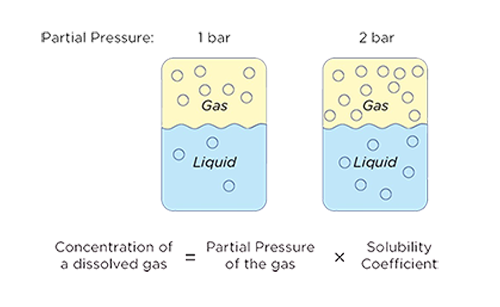
La o temperatură constantă, cantitatea de gaz dat care se dizolvă într-un anumit tip și volum de lichid este direct proporțională cu presiunea parțială a gazului în echilibru cu acel lichid. Este necesară presiunea pentru ca un gaz (oxigen) să se dizolve eficient într-un lichid (plasmă sanguină). Când se află într-un mediu hiperbaric, niveluri mai mari de oxigen sunt capabile să ajungă adânc în țesuturile corpului.
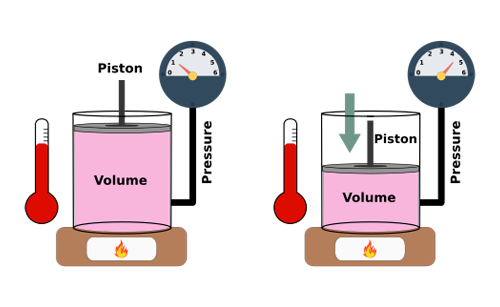
Când temperatura este constantă, volumul unui gaz este invers proporțional cu presiunea, iar densitatea unui gaz este direct proporțională cu presiunea; Pe măsură ce presiunea crește, dimensiunea moleculelor de oxigen scade, creând un mediu de oxigen mai dens. Moleculele de oxigen din alveole (membrana pulmonară) devin mai concentrate și fac posibil ca mai multe molecule de oxigen să fie transferate în sânge prin difuzie, ceea ce saturează plasma sanguină.
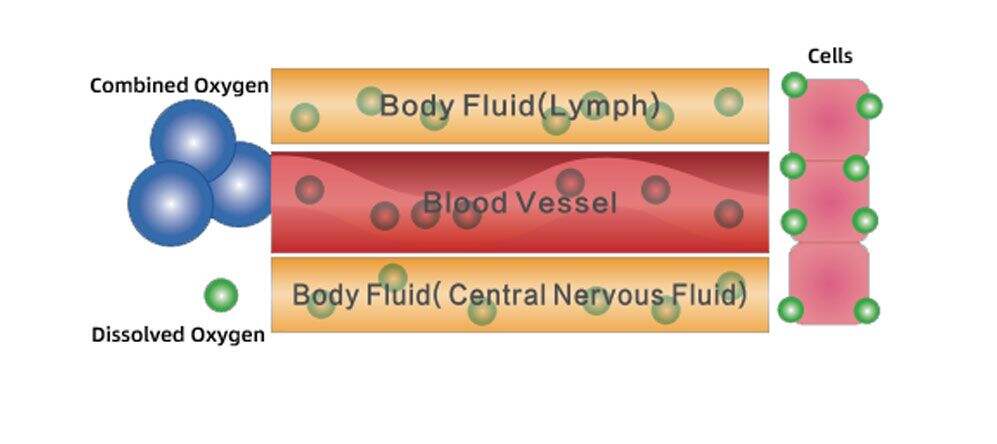
Transportul oxigenului poate fi clasificat în „oxigen combinat și oxigen dizolvat”. Când intră în sânge, majoritatea oxigenului va fi combinat cu hemoglobina, apoi devine oxigen combinat. O altă parte a oxigenului va fi dizolvată în plasmă direct și fizic, apoi va deveni oxigen dizolvat. Prin urmare, oxigenul combinat este dificil să treacă prin peretele vascular îngust, în timp ce oxigenul dizolvat este mai mic și se poate dizolva foarte mult în sânge și lichid în circumstanțe hiperbare.
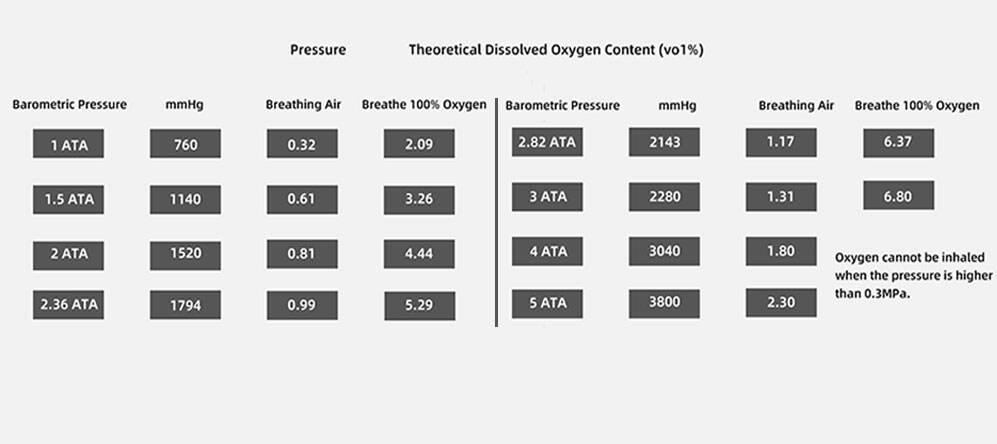
Relația dintre oxigenul hiperbaric (într-un mediu presurizat) și oxigenul normobaric poate fi înțeleasă ca o relație cantitativă spre calitativă. Inspirăm oxigen pur la presiunea atmosferică, saturația de oxigen din sânge poate ajunge și la 100%. Cu toate acestea, inhalarea oxigenului în mediul de oxigen hiperbaric, nu numai că modifică saturația de oxigen din sânge, ci și îmbunătățește rezerva de oxigen, penetrarea oxigenului și solubilitatea fizică, etc. Efectul de îngrijire a sănătății va avea astfel și un salt calitativ!
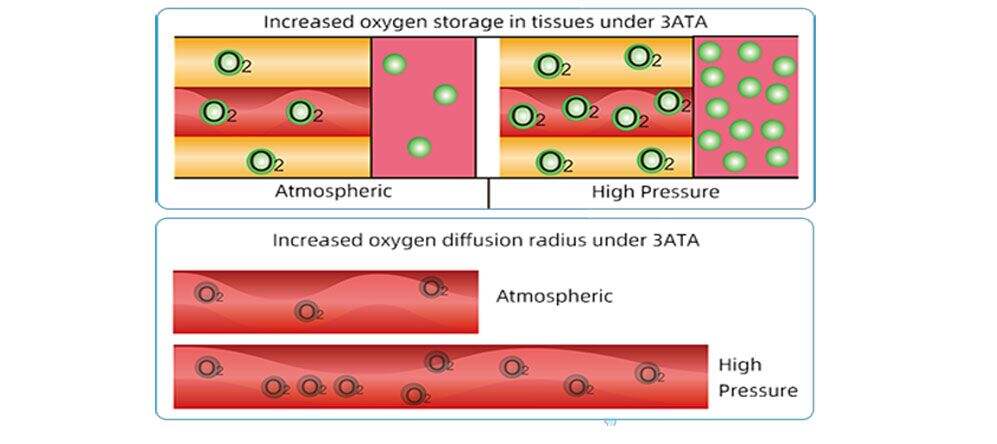
În condiții de oxigen hiperbaric, crește și țesutul diferit de stocare a oxigenului. În condiții 3ATA, stocarea oxigenului poate crește de la 13 ml/kg la 53 ml/kg, ceea ce este echivalent cu aproximativ 4 ori. Raza efectivă de difuzie a oxigenului este de aproximativ 30 de micrometri la presiunea atmosferică, care este mult extinsă în condiții hiperbare și poate ajunge la 300 de micrometri la capătul venos al capilarelor la 3ata.

Camera de unică folosință

Frecvența de utilizare a camerei

Presiunea camerei

Conținutul de oxigen
① Eliminați oboseala la exerciții
② Restabilirea forței fizice
③ Reducerea leziunilor atletice
④ Eliminarea rapidă a acidului lactic agregat
⑤ Accelerează eliminarea amoniacului din sânge
⑥ Reduceți daunele radicalilor liberi asupra organismului

Prima eliminare a valorilor acidului lactic

A doua eliminare a valorilor acidului lactic

Celulele senescente
redus cu aproximativ 11%
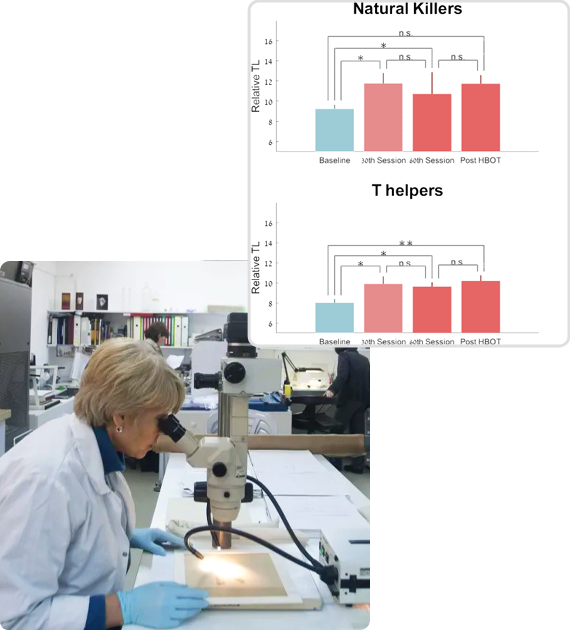

Introducere: Îmbătrânirea se caracterizează prin pierderea progresivă a capacităţii fiziologice. La nivel celular, două semne distinctive ale procesului de îmbătrânire includ scurtarea lungimii telomerilor (TL) și senescența celulară. Expunerile hiperoxice intermitente repetate, folosind anumite protocoale de terapie cu oxigen hiperbaric (HBOT), pot induce efecte regenerative care apar în mod normal în timpul hipoxiei. Scopul studiului actual a fost de a evalua dacă HBOT afectează concentrațiile de celule TL și senescente într-o populație adultă normală, nepatologică, în vârstă.

A existat o scădere semnificativă a numărului de ajutoare T senescente cu -37.30% ± 33.04 post-HBOT (P<0.0001). Procentajele celulelor senescente T-citotoxice au scăzut semnificativ cu -10.96% ± 12.59 (p=0.0004) post-HBOT.

Analiza măsurilor repetate a arătat un efect continuu semnificativ chiar și după a 30-a sesiune, cu un efect în cadrul grupului (F=8.547, p=0.01, Tabelul 2 și Figura 3).

Creierul are o cerere mare de oxigen. Hipoxia cronică ușoară a creierului poate provoca somnolență, distragere a atenției, pierderi de memorie, iritabilitate și așa mai departe. Suplimentarea în timp util a oxigenului poate îmbunătăți hipoxia țesutului cerebral, poate îmbunătăți eficiența muncii și poate reduce presiunea.

Consumul de oxigen al creierului este, de asemenea, mare. Furnizarea de oxigen este eficientă pentru a elimina oboseala creierului și pentru a reduce presiunea. Poate fi folosit pentru ca studenții nu numai să ușureze tensiunea înainte de examinare, să reducă povara psihologică, dar și să îmbunătățească capacitatea de transport a sângelui și utilizarea oxigenului și să regleze capacitatea organismului de a furniza oxigen.

Insomnia pune celulele creierului într-o stare de lipsă de oxigen. Oxigenul hiperbaric poate crește solubilitatea oxigenului din sânge, îmbunătățește fluxul sanguin în circulația posterioară a creierului și îmbunătățește alimentarea insuficientă cu sânge a sistemului de activare reticular superior al trunchiului cerebral.

Terapia HBOT stimulează creșterea de noi vase de sânge în circulație și accelerează metabolismul, crescând astfel rata de vindecare a rănilor. De asemenea, crește rezistența prin celulele albe din sânge.
În zilele noastre, oxigenul hiperbaric este adesea folosit ca metodă de tratament adjuvantă, adică tratamentul convențional ca bază, combinat cu terapia cu oxigen hiperbaric ca adjuvant, cum ar fi următoarele boli au rezultate foarte bune: boala Lyme, leziuni cerebrale, accident vascular cerebral, diabet, Autism, cancer, boli cronice de inimă și plămâni, boală hipoxică acută, otrăvire cu monoxid de carbon, boli digestive, arsuri